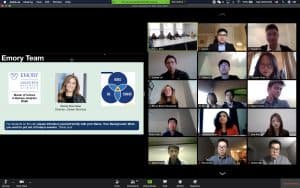Everything happens for the best
The coronavirus outbreak required changing the annual West Coast Trek to a virtual trip this year. While I still wish that we had had the chance to visit the tech giants in San Francisco Bay Area during the spring break, the virtual West Coast Trek still gave me and my colleagues an opportunity to witness the spirits of rigor, courage and innovation that prevail in the field of technology and encouraged us to think about how we could leverage the skillsets we have to create value for businesses.
During the virtual session with Uber, I was fascinated by John Walter’s description of his experience building the Analytics & Insights team from scratch. Back then, it was much harder to spread the idea of data analytics because “big data” was merely a concept. However, he managed to stick to his heart and developed the team step-by-step to achieve what they have become today. As the head of courier pricing strategy at Uber Eats today, John Walter has only spent a few months in his new position but has continued to drive business insights based on data and his past experiences, which is very inspiring.
Shanshan Gong, the A&I manager of US&C CommOps S&P, had professional experience in consulting and analytics before joining Uber. With a job focused on customer support, she is able to integrate her previous experience with data science to deliver insights and actionable results. Almost every one of the panelists who spoke with us noted how fast time flies, which is especially true in the analytics field. Regardless of whether it is the programming languages themselves or the packages and libraries associated, they are all being updated and improved constantly, creating new challenges and possibilities. As future business data scientists, my colleagues and I have all become well-aware of the process and are all committed to bringing our passion and professionalism to the field.
The Google virtual session was also exceptionally helpful to me. Many panelists shared their thoughts on how to find the right job at the right company, one that has an encouraging culture and that empowers individuals. We were fortunate to get an insider’s look when Kristen Tripp, global recruiter at Google, talked about the qualities that Google seeks when screening candidates. She told us that first, Google looks for candidates with organized thinking and strong problem-solving capabilities. Secondly, it looks to hire individuals who are aligned with Google’s mission of organizing information for everyone, and have leadership and coordination abilities, which are essential to continuing the tech giant’s global impact. Third, a job candidate’s role-related knowledge demonstrates how well they know about the position they’re applying for and their self-awareness of suitability. Last but not least, “Googleyness,” which refers to teamwork in Google, is a measure of a candidate’s ability to cope with challenging teams and tasks. We MSBAs all appreciated the information and will use it as a guideline for personal development and career advancement.
Thanks to ever-evolving technologies and humans’ enthusiasm for information sharing, we had the opportunity to learn about the careers, routines and aspirations of data science professionals in the age of social distancing. Though we did not have the chance to speak with the experts face-to-face or experience the innovative vibes in the most successful tech firms, through our computer screens, we were still able to feel the power of data and how it has transformed the way people think and work.
Everything happens for a reason. Everything happens for the best. Bearing that in mind, the current MSBA cohort is more confident than ever to combine their business knowledge and technical skills to make a difference.

